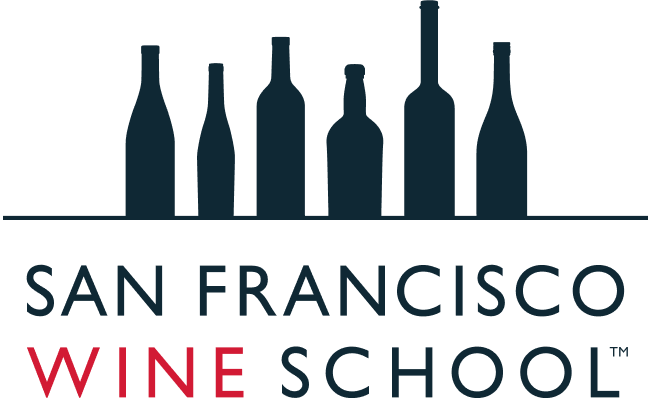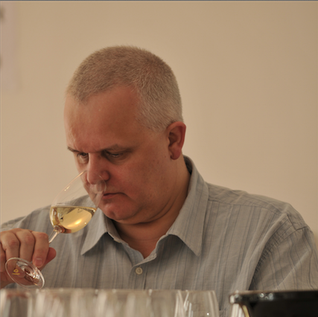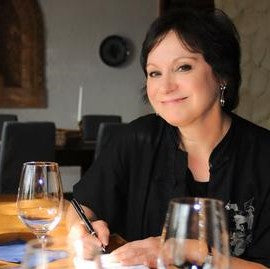by David Furer
Prof. Monika Christmann and I met in Chicago soon after she'd completed her time working on Simi Winery's winemaking team having begun as Department Head for both Oenology & Wine Technology and the Winery at her native Germany's Geisenheim Research Institute. Since then she's authored or co-authored many groundbreaking treatises on wine research and technology, since 1995 served as a representative in varying capacities to the International Organisation for Vine and Wine (OIV) for which she's now a Vice-President, taught wine academics and professionals throughout Europe along with being a frequent guest speaker for the Institute of Masters of Wine, and currently lectures on enology for Montpellier's Euro-Masters program. Whenever I've the pleasure of speaking with or listening to her I'm impressed not only by her expansive breadth of knowledge, but also with the keen and genuine interest she continues to express for our favorite beverage. What was expected to be a 20-30 min. interview extended to 48 with no exertion made.
Your presentation at next year's International Cool Climate Wine Symposium is entitled 'Optimizing Cool Climate Wine Styles'. Please elaborate upon what you intend to speak of.
It's quite important to show the difference between cool and warm climate wines--those with high alcohol and those with higher acidity. The aromatic, lower alcohol wines are being lost a bit because of climate change. When you go back 20 years to i.e.the Mosel looking for elegant, lighter styles of Rieslings you could easily find them; we don't have them anymore. Because of climate change and because of the tendency towards increasing alcohol levels, as in some way they represent 'better' wines, we're now seeking wines with lower alcohol but with some body. That's what I'll be focusing upon. In the past decade we've seen a dramatic increase in quality due to climate change and optimized practices by working with the wine rather than 'at' it.
How have the unanticipated recent climatic changes in the past decade impacted Germany's wine sector outside the viticulture?
If we could solve some of these problems in the vineyard then we wouldn't have to deal with them in the cellar. We've seen changes in enology in the past decade that have been more dramatic than those 50 years before. 20 years ago we focused on must concentration; only 10 years later we began looking at alcohol reduction--the opposite. Now we need equipment that we didn't need then as we're not yet able to solve this problem in the vineyard. Spinning cone columns and the question of lower acidity/high pH we didn't think about that a decade ago…there is a need for knowing what to do with high levels of volatile acidity and phenolics. Chaptalization is no longer an issue, now the European winemaking style has become more 'international'. We need a higher degree of flexibility in that there may be a vintage in which we ought to do chaptalization while the next we may not. Sometimes we see people going back to old techniques like amphora and making orange wines, but I think we should look for moderation rather than extremes.
How might the working sommelier understand the issue of what they see as increasingly high alcohol levels in wine?
When I lecture in many countries for the WSET I always ask the same question 'is there a demand for lower alcohol in wines?' They all say the same - that the consumer asks for lower alcohol wines. We have to discern what it is the market will accept and is willing to pay, and how it is they imagine wines with varying alcohol levels taste.
What from your German schooling did you bring to your work at Simi Winery?
It's a hard question for me to answer, better to ask people at Simi. The educational level of German winemakers is very high with most winemakers having an undergraduate degree in enology. At the time they were looking at an international approach and I was dealing with lab issues of wine treatments and quality control. The winemaking team culled its decisions from many opinions.
What did you learn from your tenure there that's informed your work today?
I found a fascinating the very detailed approach to winemaking procedures, continuously noting them as a very good mechanism which wasn't done typically in Europe. The question of how to apply SO2 in having upfront trials was new; during my first week we did a Chardonnay bottling in which the winemakers asked for three levels of testing, something I couldn't believe in coming from Europe that there would be a difference between these samples. That really opened my eyes to these very important little details in winemaking.
What transformative scientific developments do you foresee occurring within the next five years in viticulture and vinification that may not yet be communicated of in the wine trade press?
We're really looking into the question of winemaking possibilities with lower impact onto the wine. processes which are less stressful, more selective, and leave less residues. We already see that in acid adjustments, alcohol and volatile acidity reduce. Another issue is sustainability, what it means in the wine production sector. We're encountering problems which can't be solved on a technical basis as they're more philosophical. GMO vines for some countries say 'yes' as we can better control pesticide use whereas other countries say 'no'.
The antioxidant qualities of phenolics in red wine--something which to rely upon as an adjunct to better health?
We did a Ph.D thesis together with the U. of Giessen looking into this from a medical perspective with regards to resveratrol--can we find something of this in human body liquids? There wasn't a higher input to the bloodstream, but we read of much research in which medical doctors see that moderate wine consumption is good for health--but I think this is also the case for white wines. So for example males from 50 years of age can reduce osteoporosis by drinking white wine, so all wines might have corresponding benefits.
How does specific site selection impact the qualities of Riesling in Germany?
This approach is leveled by the VDP, but in difficult vintages this could be problematic. Here in the Rheingau, the scientifically-based classification map that's been developed shows that we can have vineyards with higher qualities. It'll be interesting to see how this develops in the future. In famous and traditional Riesling areas we see that it's sometimes becoming too hot for Riesling. There are different approaches in how to deal with this.
What pitfalls should be avoided in the education of wine trade professionals?
A good teacher shouldn't be too biased, should be open to all that is happening. You can have a conservative approach, but different times require different strategies, something a good teacher should know about and share with students. That's what I do here at Geisenheim--make the students think.
With the exception of certain areas of vineyard labor and laboratory research, to what do you attribute the relatively slow acceptance of women in varying roles working with wine?
When I took my position here it created a revolution. For 14 years I was the only female professor, but now we've many. The OIV hasn't the US as a member but it's the highest wine scientific and political organization in the world with 46 member states. It now has a woman president from Argentina, and we might have another female elected in July.
For more information on next year's International Cool Climate Wine Symposium go to www.iccws2016.com
Learn more about the cool climate wines of the world in our Cool Climate Wines of the World Workshop.
Check out our full schedule of programs, workshops and public events. Private, customized experiences and corporate training is also available.



